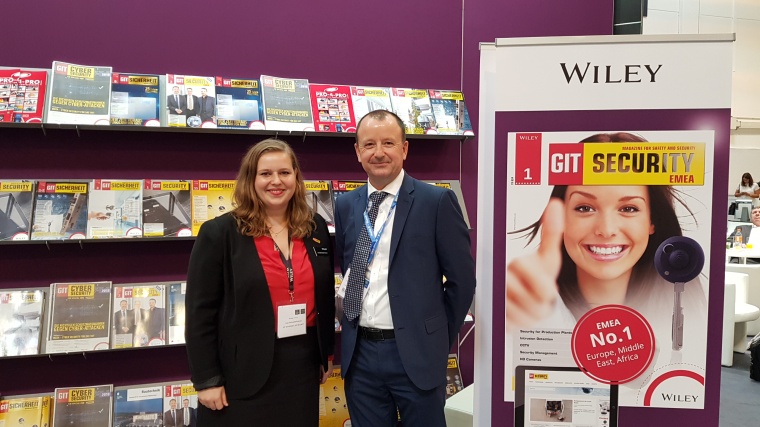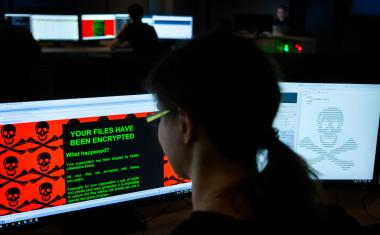The Challenges of Handling Hard Drives and How to Recover Data
GIT SECURITY had the opportunity to talk to Stephen Jones, surveillance lead EMEA at Seagate, who gave us some interesting explanations about hard drive handling. Announcing the Sk...

GIT SECURITY had the opportunity to talk to Stephen Jones, surveillance lead EMEA at Seagate, who gave us some interesting explanations about hard drive handling. Announcing the SkyHawk 14TB hard drive at Security Essen 2018, Lisa Schneiderheinze, Editor at GIT SECURITY, had some questions about the importance of storage in an increasingly intelligent and connected surveillance world.
GIT SECURITY: Stephen, Seagate developed a 14TB hard drive optimized for surveillance purposes. Can you please explain what special requirements had to be met with current developments in the surveillance industry?
Stephen Jones: As we know in the video surveillance industry, manufacturers create very rich content with a lot of the compute power actually happening at the end device, typically being the camera. Camera resolutions are increasing with 4K and 8K now available. More applications are actually running on the end device, and the amount of rich video content is rapidly increasing and therefore there’s a requirement to have higher storage capacity within the recording technology. Hence, the need for higher-capacity hard drives, which is also the reason why the 12-14TB SkyHawk is that next step. We’re driven by the demands of the technology within our sector.
What is the best way to engage with end-users or systems integrators and installers as customers?
Stephen Jones: It’s a really good question, actually. My experience is that downstream costumers are extremely important, specifically the systems integrators and the installers who are handling the projects on a daily basis and have the engagement with the end-users. The difficulty with that is, the numbers are massive and wide-spread and very fragmented and therefore, unless you have the physical resources on the ground, you choose an easy way to engage with the customer. And our engagement typically is with manufacturers and technology companies who also have that relationship with the systems integrators and the installers. So, we effectively choose that route that works best for us.
What is the main challenge that you face as a storage provider?
Stephen Jones: I think the main challenge is that most companies underestimate the importance of storage technology for video surveillance. Thus, it is our task to show this to them by optimizing the technology, adding value through features like SkyHawk Health Management which you’ll see in a lot of the Hikvision products, as well as with Dahua which we have launched here at the show. We also have a lot of unique services like data recovery services that are a good fit for the surveillance industry, and that service is actually unique to Seagate as a hard drive manufacturer. So, there are specific key elements that we can focus on and align directly to the surveillance market which we feel effectively makes our offerings unique.
Together with Andy Palmer we were discussing the introduction of AI to the industry and your SkyHawk AI hard drives. Breaking it down: Why do you need a specific hard drive for AI applications what has changed since AI technology has appeared?
Stephen Jones: The reason why you need a specific hard drive for AI is that the workloads change. When we record video, we effectively put the video into sequential lines and then place it on to the hard drive. By implementing AI streams, we introduce meta data which has to reference the video that has been recorded. Sequential rights then become random and that’s why the workload also increases. Therefore, the fundamental way that we place the data on the drive changes, which is why you need an optimized AI drive.
In general, it’s a really complicated discussion, because everybody defines AI differently. AI to me is advanced video analytics. Applications like facial recognition, left baggage, queue detection, heat mapping. Effectively, all that technology uses meta data for consistently referencing the recorded video which is the reason why the technology undergoes a fundamental change. Consequently, you need a more robust hard drive technology that can handle the increased workload through AI.
What new markets have opened up for you since AI has been introduced?
Stephen Jones: AI is very broad-ranging, and it covers lots of verticals. There’s a lot of technology that is end device based, hidden inside of an encoder, or systems that are server-based, or even cloud-based, and these link to all the vertical markets: retail, critical and national infrastructure, transportation etc. What it does allow us to do is to position our product specifically within the key markets and also the key verticals. So, it provides a starting point to quite an important discussion for companies who are potentially going to deploy AI applications at some point in the future. Additionally, AI leverages IoT which is another big topic everybody is talking about. With IoT, we also see a big opportunity within the surveillance market.
What does Seagate do on the services front?
Stephen Jones: One of the things that we have only finalized recently is our own training and certification platform. This looks at the general surveillance market, the underlying HDD technology that we provide, as well as the difference between the typical desktop drives and the drives optimized for surveillance. It’s really about using the right drive for the right application. That leads us to AI, but also to additional services like SkyHawk Health Management and Seagate Recovery Services. Our training and certification platform also takes drive handling into account, which is another important factor for installation companies and systems integrators. Around 60 percent of drive related loss issues on site are due to incorrect handling of the hard drive.
What does Seagate teach in the training courses?
Stephen Jones: In our training courses, we go more into depth. We explain the technology inside. When you open up a hard drive, you see precision engineering. Therefore, you need to handle it with care. For example, you have to take environmental circumstances into account, for instance taking the drive out of a transportation van and plugging it into an NVR on a cold morning, condensation can be an issue if not handled properly. And that is something we want to communicate in our courses.
Can you also elaborate on the recovery services?
Stephen Jones: It is an inhouse data recovery service, called Seagate Data Recovery Service (SRS). To better understand why it is relevant for the surveillance industry, I will give you an example. There has been a burglary at a small installation retail shop. Perpetrators enter, they are wearing gloves and baseball bats and they smash up the place. Typically, they target the CCTV system and they destroy the NVR. Now, for that specific time of the burglary which is of the greatest interest, the shop owner wants to retrieve the date from the hard drive. So, the perceived value of the data is huge and outweighs the overall capital expense the owner has put into buying the system originally. The SRS provides a secure courier to collect the hard drive and we send it back to our Seagate secure lab in Amsterdam. Our lab technicians recover the data of the damaged hard drive, transfer it onto a separate device and deliver it back to the end-user. This service is included when purchasing the SkyHawk AI and can be added when buying one of the other SkyHawk models. From a systems integrator’s point of view they see it as a an additional service to resell that can be part of their ongoing maintenance agreement and can potentially produce growing revenue. To the end-user that cost is actually quite low when compared to the perceived value of the data that you may retain after a catastrophic failure or water damage or even fire damage, vandalism or whatever it may be.














